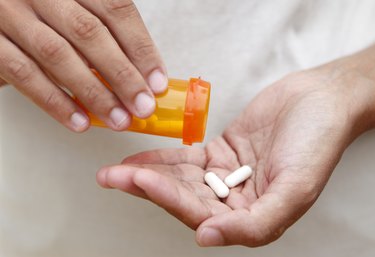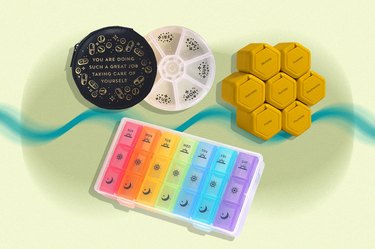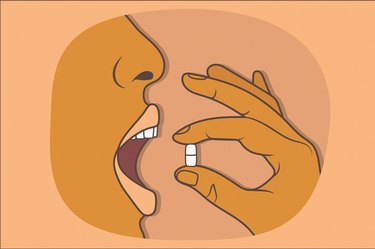
Gagging or choking while trying to take your medications is never fun. But if you have trouble swallowing pills, this unpleasant scenario might be a regular occurrence. So what can you do to make the medicine, y'know, go down?
"Trouble swallowing pills is something we deal with all the time, especially with larger tablets and capsules," says Danielle Hambrick, PharmD, operational enablement manager of diagnostic testing for Walgreens. And there's almost always something that can be done to make the situation easier. Here are six strategies to try.
Video of the Day
Video of the Day
Warning
The strategies included here are suggestions for people who have trouble swallowing pills but not trouble swallowing in general. If you or the person taking the medication has swallowing difficulties (such as dysphagia), these tactics could be choking hazards.
1. First, Talk to Your Pharmacist
Whether you have trouble with pills in general or a new prescription in your pillbox seems to be causing problems, let your pharmacist know. "That's what we're here for, to problem solve," Hambrick says.
In some cases it might be possible to switch from a pill to another delivery form that's easier to ingest.
"A lot of drugs may be available as disintegrating tablet or as a liquid," Hambrick says. If the pharmacist has an alternative in mind, they'll contact your prescribing doctor to confirm that making the switch is okay.
2. Hydrate Your Throat
A dry throat can make it harder for a pill to go down smoothly, Hambrick says. To lubricate, she recommends drinking a glass of water before attempting to swallow, in addition to the usual glug you take when you actually put the pill in your mouth.
Over-the-counter sprays and gels like Pill Glide Swallowing Spray ($9.99, Amazon) can have a similar effect. "It can make swallowing easier by making things a little more slippery," Hambrick says. These are typically considered supplements, so it never hurts to confirm with your pharmacist that a or gel is safe to use with your particular med.
3. Change Your Posture
It's normal to instinctively tilt your head back when you're trying to swallow a pill to help it get down easier. But doing so can actually increase the risk for gagging or choking. Believe it or not, you'll get better results when you lean forward, per a July 2018 review in Patient Preference and Adherence.
"When you have a pill in your mouth and you lean forward, the pill floats toward the top of your mouth," Hambrick explains. So when you go to swallow, the pill ends up going down first. Leaning forward also widens your airway, making it easier for the pill to fall straight down your throat.
Here's how to do it: Sitting or standing upright, place the pill on your tongue and take a medium sip of water. Then bend your head slightly forward, with your chin tilted towards your chest, and swallow the water and pill together.
4. Ask About Cutting the Pill in Half
Slicing your pill into two smaller halves can make them go down easier, and in some cases, it might be a viable option.
"But it depends on the medication, and you really have to check in with the pharmacist before you do it," Hambrick says.
Even though pill-cutting is common, the practice can potentially make your medication (and supplements) less effective, per the Cleveland Clinic. That's especially true for extended-release pills, liquid- or bead-filled pills or asymmetrical pills, which should never be cut in half.
5. Inquire About Mixing the Pill With Food
Crushing a pill and mixing it with some yogurt, pudding or applesauce is another way to make the medicine go down. But again, it's crucial to get the green light from your pharmacist first.
"Crushing or opening a capsule could change the way the drug works, especially when it comes to extended-release pills," Hambrick says.
Make sure your pharmacist knows exactly what food you'll mix your pill with, too. Certain food-drug interactions could alter the effects of your med, per the Mayo Clinic.
6. Try a Pill-Swallowing Cup or Straw as a Last Resort
Specially designed over-the-counter cups or straws claim to make swallowing pills easier. But there's not enough research to show whether they're effective or not, according to the Patient Preference and Adherence review.
Hambrick's take? "They can be worth a try if all else fails, though I might not make them my first option," she says.
Finally, Don't Give Up
Even if a pill is giving you problems, you shouldn't stop taking it without medical clearance. Instead, let your doctor know about the situation. Together with the pharmacist, you can come up with a way to take your meds that's both comfortable and safe.
"A solution can be found," Hambrick says.
Is this an emergency? If you are experiencing serious medical symptoms, please see the National Library of Medicine’s list of signs you need emergency medical attention or call 911.


